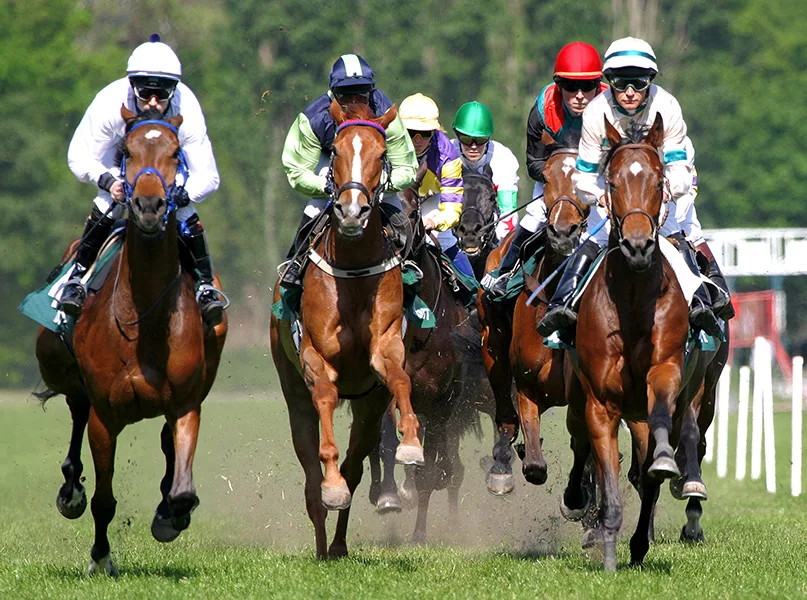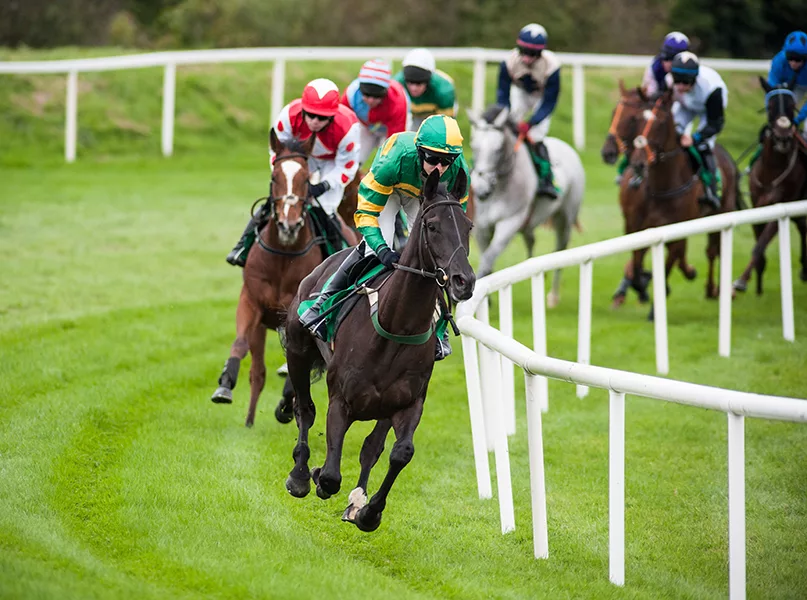Each year, the build-up to the Gold Cup, Cheltenham Festival’s most sought-after event, garners tension, exhilaration, and jubilation amongst spectators and pundits alike. This year is no different, as the race celebrates its centenary year.
A HISTORY OF HORSES AND HEROES
Having welcomed over 160,000 attendees in 2024, Cheltenham Festival is recognised as one of the UK’s biggest annual horse racing events.
Known for its high fashion and world-renowned courses, the much-loved festival is one of the most anticipated jump racing occasions in the country’s equestrian calendar.
This year, the festival’s biggest race, the Gold Cup, celebrates its 100th anniversary. Traversing two and a half furlongs, with 22 fences to be jumped along the way, the race has been acknowledged in the echelons of history as the world’s most impressive equestrian steeplechase.
Marking a milestone in the prestigious event’s timeline, the Gold Cup’s centenary year, dubbed Gold Cup 100 (GC100) by organisers, was celebrated with themed activities, including a parade of the legends of the race featuring horses that have historically competed.
Hailed as the pinnacle of the 2024 festival, this year’s Gold Cup was certainly one to remember.

100 YEARS OF VICTORY
The origins of the Cheltenham Gold Cup date back to 1924, when the race was run as a standalone jump racing event. Red Splash, ridden by Dick Rees, was officially named the cup’s first winner.
However, it took several more years for the race to garner widespread attention or to be integrated into a national equestrian festival. In 1928, the Gold Cup became an important part of Cheltenham Festival, which had only been established a handful of years prior.
Soon after the Gold Cup’s inception and debut at the festival, historical and political events such as World War II posed challenges. However, the race continued to gain traction and, during this time, attracted prominent champions such as Golden Miller, who enjoyed five consecutive victories from 1932 to 1936.
In the years following, iconic horses such as Arkle, who enjoyed a winning streak between 1964 and 1966, and legendary Best Mate, who bagged three consecutive victories between 2002 and 2004, have proven worthy contenders for the sought-after cup.
2022 saw the Gold Cup’s first female winning jockey, Rachel Blackmore, who stunned spectators on champion horse A Plus Tard, winning by a spectacular 15 lengths.
As such, the Gold Cup has borne witness to countless historical moments and horse racing firsts. The event can be seen as a marker of greatness, a site of legendary rivalries, and an illustrious event that is sure to be famed and adored for years to come.

GALLOPING TO VICTORY IN 2024
This year’s centenary Gold Cup race was highly anticipated and served as an opportunity to pay tribute to the historical figures who have made the race what it is today.
The Mullins family, equestrian stalwarts who have remained centre stage for generations of horse racing history, were once again pegged as this year’s Gold Cup favourites. Trainer Willie Mullins’ fellow Irishman and Gold Cup veteran, Paul Townend, was set to ride legendary thoroughbred and previous Gold Cup winner, Galopin Des Champs.
Indeed, 2024 proved to be the fourth Gold Cup victory in six years for Mullins, who also reached the significant milestone of 100 Cheltenham Festival wins at this year’s event.
Mullins also became the first trainer to win the race twice with two different horses –Al Boum Photo, also jockeyed by Townend, previously won the festival’s showpiece in 2019 and 2020.
However, this was certainly not an easy win for the French-bred, Irish-trained racehorse, despite the favourable 5/6 odds.
Contending with the attention of notoriously fresh horse Fastorslow, another race favourite who had earlier unseated jockey JJ Slevin, the race threatened potential jeopardy, but Townend, ever the professional, kept his cool.
Eventually finishing streaks ahead of runner-up Gerri Colombe, Townend galloped to victory to become only the second jockey after Pat Taaffe on Arkle to win the Gold Cup four times.

GC100 GIVES BACK
As the famed Gold Cup celebrates its centenary, Cheltenham Festival organisers provided opportunities for spectators and sponsors alike to give back to the festival and the local community.
For example, the GC100 Community Fund, created earlier this year, supports projects that enhance the lives of those in the communities close to the racecourse.
Another initiative is the GC100 Community Art Auction, which raised money for the GC100 Community Fund. Bidding commenced on Sunday 10th March and ran until Saturday 16th March, featuring work from artists such as Tristram Lewis, Garth Bayley, and resident artist Emily Johnson.
The centenary year of the Gold Cup also presents opportunities for fans of the festival to acquire unique, one-of-a-kind ‘wild card’ items of festival memorabilia, such as special edition playing cards and Chris Pitt’s book, Let No Memories Fade.
The playing cards feature images inspired by racecourse favourites, whilst Let No Memories Fade provides a fascinating history of Cheltenham Festival’s celebrated steeplechase, drawing inspiration from 100 of the Gold Cup’s equestrian heroes.
Those who get their hands on the exclusive centenary memorabilia will not only find themselves in possession of limited-edition collector’s items, but be contributing to an important cause.
















